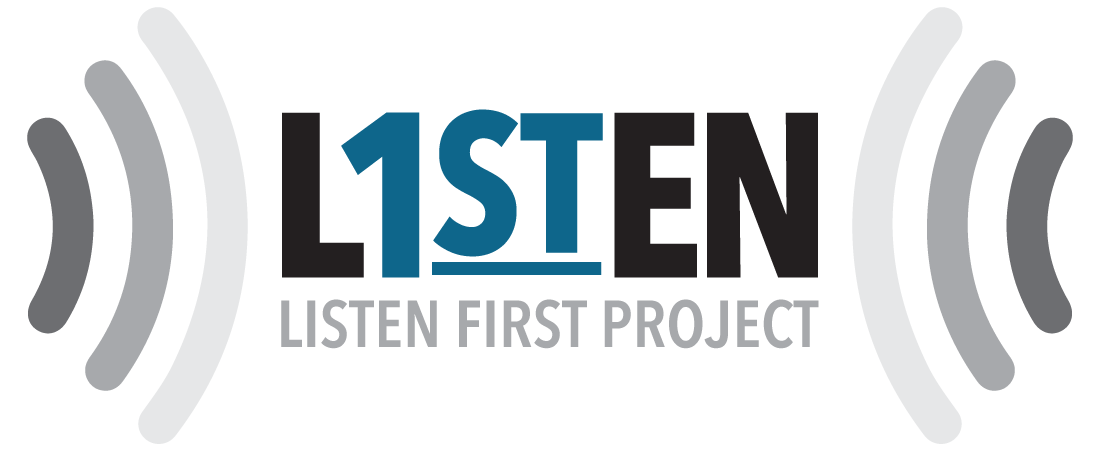In the midst of last week’s National Week of Conversation, a renewed debate broke out among top political leaders including two former First Ladies over the merits of 'civility.' While I don’t use the word ‘civility’ in encouraging Listen First conversations across divides, the ‘civility’ debate hits close to home for our more than 150 #ListenFirst Coalition partner organizations who are driving the new National Conversation Project to bridge divides and mend the frayed fabric of America.
This debate on the merits of ‘civility’—occurring between and within ideological camps—epitomizes the hyper-polarization and tribalism that has gripped American society. Increasingly, we don’t just disagree; we distrust, dislike, even despise those who see the world differently. Animosity for positions is becoming contempt for the people who hold them. Difference and disagreement are deeply personal as we both rage against and recoil from those we see as enemies across widening divides—political, racial, religious, economic, educational, generational, and more.
We frequently find ourselves talking past those with whom we disagree, dismissing them as enemies with bad intentions, threats to be destroyed, rather than fellow Americans—human beings—worth understanding. We often make very little effort to understand people outside our many increasingly narrow camps. We’re withdrawing from conversations—eroding relationships and understanding—which threatens the foundational fabric of America, creating a cultural crisis. 75% of Americans say the way we interact with each other across differences has reached a crisis level, according to Weber Shandwick’s Civility in America survey.
Part of the challenge is that many of the words we use mean very different things to different people. ‘Civility’ is no different. There is the formal definition of the term (politeness and courtesy) and then more toxic connotations. Calls for ‘civility’ are understandably threatening to some who’ve been disproportionately silenced over time, and still today. The abstract concept of ‘civility,’ however understood, is a distraction from what we believe America needs right now—fresh conversations including all voices, not about terms or behavior but with each other, sharing our diverse perspectives, experiences, hopes, and fears.
The many organizations behind National Conversation Project are interested in encouraging a shift in attitude and behavior—beginning with ourselves—that can turn the tide of rising rancor and deepening division in this country. We humbly suggest that an effort to listen first to understand each other, especially those with whom we disagree, would move us toward a stronger and more equitable future for all—one built on relationships created by conversation. Whether in personal relationships (in which being heard and understood is part of being loved) or on the front lines of activism (where conversations can galvanize support and increase understanding of resistance), we believe listening first to understand has the power to make all of us stronger.
As experts see America “at the beginning of a soft civil war” and say the solution is “more positive social connections,” we are committed to encouraging conversations that move ‘us vs. them’ toward ‘me & you.’ All are welcome and necessary. This unprecedented collaborative effort to bridge divides won’t work if only a portion of Americans join the conversation. We recognize that for much of America’s history, many have been excluded from the conversation. That must change now.
75% of Americans say they're willing to set a good example by practicing conversations across divides, according to Weber Shandwick. 36%—more than 100 million people—want to see a national campaign promoting such conversations. That campaign is the new National Conversation Project which is promoting in-person and virtual conversations that prioritize listening first to understand on any topic during semi-annual National Weeks of Conversation, on the first Friday of each month (Listen First Fridays), and throughout the year—inviting people of all stripes to revitalize America together.
Leaders from both sides of the aisle similarly recognize the problem and solution. President George W. Bush has decried, “discourse degraded by casual cruelty,” observing that “argument turns too easily to animosity; disagreement escalates into dehumanization.” In opening his Foundation Summit, President Barack Obama said, “Why don't we practice what we preach and listen first.”
As for other national leaders, we invite them to join the many thousands of Americans who have committed to "listen first to understand." Dozens of current candidates for office—across the ideological spectrum—have signed the Listen First Pledge and are campaigning as Listen First Leaders. Other influencers championing #ListenFirst include former party chairs (Donna Brazile & Michael Steele), journalists (Bret Baier), athletes (Dominique Wilkins), business leaders (Stephen M.R. Covey), activists (Susan Bro & Christian Picciolini), musicians (Peter Yarrow), mayors (Robyn Tannehill), superintendents (Dr. Catherine Edmonds), doctors (Dr. Brian Williams), and religious leaders (F. Willis Johnson & Cissie Graham Lynch).
Revitalizing America and finally achieving its promise as “indivisible, with liberty and justice for all” will require all of us, together. Let’s get started.
Pearce Godwin is Founder & CEO of Listen First Project, Executive Director of National Conversation Project, and leader of the #ListenFirst Coalition of 150+ partner organizations. He catalyzes the #ListenFirst movement to mend the frayed fabric of America by bridging divides one conversation at a time. Godwin can be reached at Pearce@ListenFirstProject.org.
